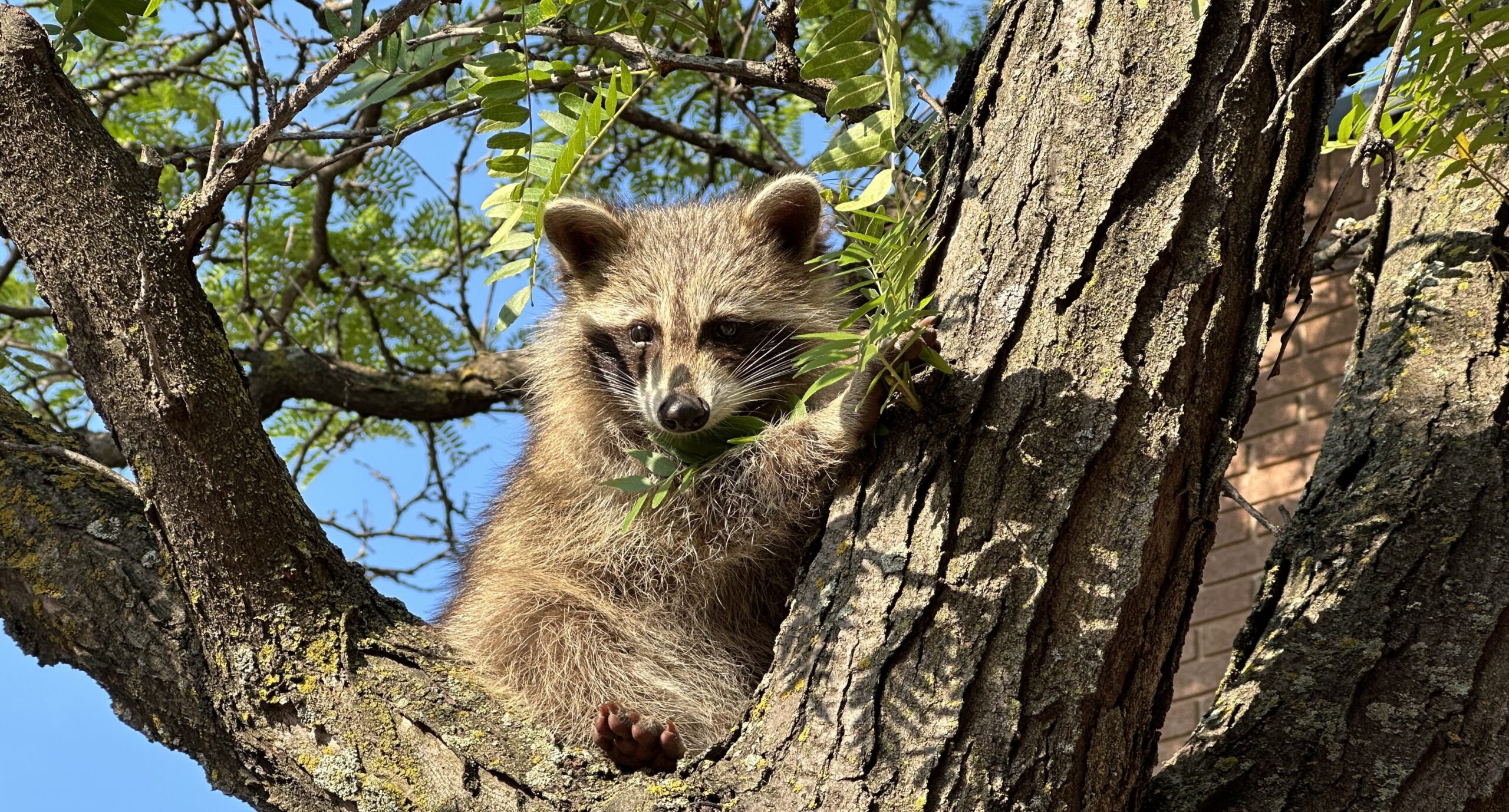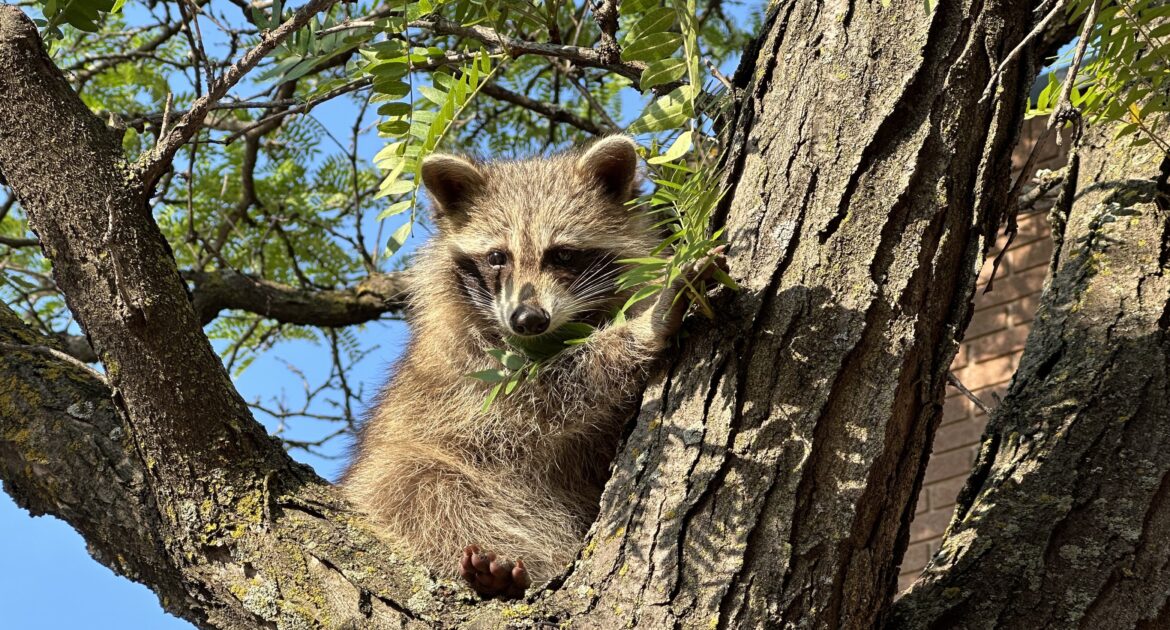Pittsburgh, known as the City of Bridges, isn’t just a haven for breathtaking architecture and rich culture—it’s also a hotspot for urban raccoons. These clever creatures have adapted remarkably to city life, making homes ideal targets for finding shelter and food. From crawling into attics through weakened roof vents to overturning trash bins for an easy meal, raccoons don’t shy away from our urban environment.
For homeowners, understanding urban raccoon prevention strategies is essential to protecting homes from raccoons and implementing effective raccoon-proofing strategies for Pittsburgh homes.
Why Are Pittsburgh Homes a Target for Raccoons?
The very features that make Pittsburgh a vibrant city also make it attractive to raccoons. Our abundant green spaces, like Frick Park and Schenley Park, serve as stepping stones for raccoons traveling between urban and residential areas. Combined with the accessibility of food sources and warm hiding spots, Pittsburgh homes are prime real estate for these animals.
Here are a few reasons why raccoons target your home:
- Trash Availability: The accessibility of trash, especially in unsecured cans, is a major draw for raccoons. They’re opportunistic feeders and can easily locate food scraps left outdoors or in poorly secured containers.
- Structural Vulnerabilities: Aging homes with weak roof vents, damaged soffits, or gaps around chimneys are easy entry points for raccoons. Once inside, attics provide a safe, warm, and dry environment for them to nest and raise their young—especially during spring.
- Dense Neighborhoods: The close proximity of homes in neighborhoods creates a network of potential hiding spots. Raccoons use roofs, fences, and treetops to travel from one home to the next.
Understanding these factors can help homeowners take the first step toward protecting their properties. Addressing these vulnerabilities early can save you time, money, and stress in the long run.
Protecting Homes From Raccoons
Defending your home against raccoons requires a proactive approach. Unlike other wildlife, raccoons are clever and persistent, often outsmarting basic deterrents. Here are some effective ways to protect homes from raccoons:
- Secure Trash Bins
Raccoons are famous for rifling through trash cans. Ensure your bins have tight-fitting lids, or choose raccoon-proof bins with locking mechanisms. Keep garbage inside the house or garage until the morning of collection day to minimize temptation.
- Inspect and Repair Vulnerable Entry Points
Weak points like roof vents, soffits, and chimneys are prime entry opportunities. Regularly inspect your home for signs of damage or wear and tear. Install heavy-gauge steel mesh over vents and chimney openings to block entry. Additionally, replace any rotted wood around eaves or siding.
- Maintain Your Yard
Raccoons use overhanging branches and fences to gain access to roofs. Trim tree branches back at least 6 to 8 feet from your roofline. Clean up fallen fruit, birdseed, or any other food sources from your yard to avoid attracting them.
- Install Motion-Activated Deterrents
Motion-activated lights or sprinklers can startle raccoons and discourage them from coming near your home. These deterrents work best when combined with other strategies to reinforce your efforts.
- Consider Professional Assessment
Raccoons are skilled at finding hidden vulnerabilities. A professional wildlife control expert, like our team at Skedaddle, can assess potential entry points, secure your home, and provide customized recommendations tailored to your property.
Taking these steps can dramatically reduce the likelihood of raccoons entering your home, keeping your family safe from the associated risks.
Raccoon-Proofing Strategies For Pittsburgh Homes
Raccoon-proofing is a more comprehensive approach to ensuring your home stays protected over time. This involves a combination of preventative measures and ongoing vigilance to maintain the integrity of your property.
Identify Signs of Raccoon Activity
- Scratching or thumping noises in the attic at night.
- Droppings near entry points, on porches, or close to trash bins.
- Torn shingles, damaged vents, or visible claw marks near rooflines.
Spotting these early signs can help you address a potential issue before it escalates.
Implement Year-Round Maintenance
Pittsburgh experiences distinct seasons, and changes in weather can create new vulnerabilities in your home. For example, ice buildup can damage soffits, providing entry points for raccoons during winter or early spring. Schedule seasonal checks to ensure your home remains secure year-round.
- Use durable materials like steel screening to block entry points.
- Regularly inspect and clean gutters to prevent wildlife nests.
- Seal foundation gaps to keep raccoons from burrowing under structures like decks and porches.
Avoid Attracting Raccoons to Your Property
While raccoons can be challenging to deter, reducing what attracts them is key. Here are some additional tips to keep your property uninviting for raccoons:
- Harvest garden crops promptly to deny easy food sources.
- Remove outdoor pet food bowls overnight.
- Use bungee cords or straps to secure compost bins and protect them from tampering.
Act Early
Raccoons are determined once they’ve decided your home is their target. Acting early is the best way to prevent costly damage. Whether you need to repair an access point or secure your trash, taking immediate action to address vulnerabilities can help protect your home from future invasions.
When to Contact Skedaddle for Raccoon Removal Services
The best time to contact Skedaddle for raccoon removal services is as soon as you notice signs of raccoon activity in or around your property. Early intervention is key, as raccoons can cause significant damage if their presence is left unchecked. Common signs of raccoon activity include unusual noises such as scratching, thumping, or chirping sounds coming from attics, walls, or crawl spaces. You may also notice visible damage, such as torn shingles, soffits, or vents, which could indicate an access point into your home.
- Call Skedaddle immediately if you suspect raccoons are nesting.
- Spring and summer are critical times as raccoons may have litters of kits.
- Skedaddle professionals specialize in safe and humane removal.
- Mothers and their young are safely relocated together.
Additionally, you should reach out to Skedaddle if you’re unable to prevent raccoon activity despite taking precautions, such as securing trash bins or sealing entry points. Our team has the expertise to assess vulnerabilities and implement long-term prevention strategies effectively. By acting promptly and relying on a professional service like Skedaddle, you can protect your home, avoid costly repairs, and ensure the well-being of the wildlife involved.
Why Urban Raccoon Prevention in Pittsburgh Matters
Urban raccoon prevention isn’t just about protecting your home—it’s about creating a safer and healthier living environment for your family. Raccoons carry diseases like rabies and roundworm that can pose a risk to humans and pets. Furthermore, the damage they cause to attic insulation, wiring, and ductwork can lead to expensive repairs.
Living in Pittsburgh means sharing our space with wildlife, but harmonious coexistence starts with clear boundaries. By implementing these strategies, homeowners can ensure their properties are safe, secure, and less attractive to raccoons.
Defend Your Pittsburgh Home Today
Keeping raccoons out of your Pittsburgh home requires diligence, strategy, and the right know-how. Whether you’re securing entry points, maintaining your yard, or installing deterrents, taking preventative measures is your best defense. If you’re already hearing noises in the attic or noticing signs of raccoons around your property, it’s time to act.
At Skedaddle, we’ve helped countless homeowners secure their homes from raccoons with humane and effective solutions. When you work with us, you can rest easy knowing that your home is protected. Contact us today to schedule a professional assessment and protect your home from unwanted visitors.




